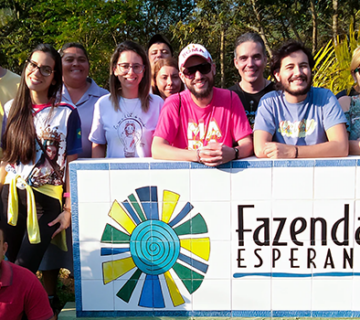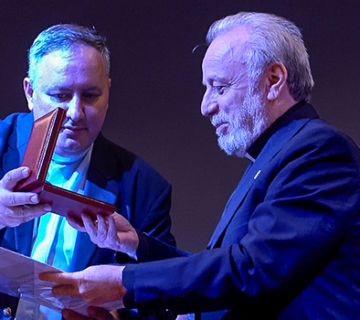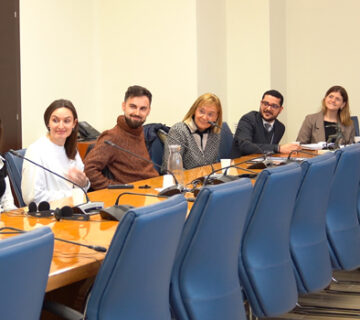 The “Sophia” University Institute, born from an intuition of Chiara Lubich, founder and president of the Focolare Movement (Work of Mary), and developed together with an international group of academics, was officially set up by the Holy See with a decree on December 7 2007.
The “Sophia” University Institute, born from an intuition of Chiara Lubich, founder and president of the Focolare Movement (Work of Mary), and developed together with an international group of academics, was officially set up by the Holy See with a decree on December 7 2007.
Campus – The Institute’s campus will be in Loppiano, the Movement’s little town near Incisa Valdarno (Florence).
Beginning with the 2008/9 academic year, the Institute will offer a two-year Master’s programme in “Foundations and perspectives of a culture of unity”. Initially it is expected that there will be fifty students per year, and in time there will be a corresponding doctorate programme.
What is offered – In the first year of the Master’s there will be courses in four principle areas: theology, philosophy, social sciences, and scientific and logical reasoning. In the second year the student can specialise in either the philosophy/theology or politics/economics track.
 Main features – the Institute will be like an academic laboratory, combining formation, study and research, and deeply rooted in Gospel relationships. It will be an original opportunity for human and cultural growth, bringing study and experience together in a community of life and thought, in which the relationship between people is the basis for the relationship between the various disciplines.
Main features – the Institute will be like an academic laboratory, combining formation, study and research, and deeply rooted in Gospel relationships. It will be an original opportunity for human and cultural growth, bringing study and experience together in a community of life and thought, in which the relationship between people is the basis for the relationship between the various disciplines.
The study, research and lessons aim to establish a constant dialogue between the teachers, and between the students and teachers. The result will therefore be harmony in what is taught by the teachers, and active and personal involvement in common research on the part of the students. The theoretical lessons will be integrated with practical exercises, guided visits, meetings with people of relevant experience, and periods of training or stages in various environments, especially professional cultural or social situations that express the “culture of unity”, like the businesses of the “Economy of Communion”. There will also be encounters with the civil and ecclesial world, with communities of various Christian traditions, with experts in the major religions and with representatives of the contemporary cultural world.
Objective – The course aims to equip those who take part with a solid cultural base, with a humanistic and anthropological emphasis, building on the university education that they have previously acquired in different disciplines. They will be expected to integrate this with new specific skills of an interdisciplinary, intercultural and relational kind.
The teaching staff – The President of the Institute is Piero Coda, who is presently Ordinary Professor of Systematic Theology at the Pontifical Lateran University in Rome and president of the Italian Theological Association. Among the teachers in residence who will also lead research in the main disciplines, are: Antonio Maria Baggio, Associate Professor of Social Ethics at the Pontifical Gregorian University in Rome; Luigino Bruni Associate Professor in Political Economics at the University of Milan-Bicocca; Judith Povilus, former mathematics lecturer in De Paul University, Chicago and coordinator of the international research group “Mathzero” in the field of formal logic; Sergio Rondinara, lecturer in Philosophy of Science in the Pontifical Salesian University in Rome and Environmental Ethics at the Pontifical Gregorian University; and Gerard Rossé, Professor of New Testament Exegesis at the Istituto Mystici Corporis in Loppiano and at the École di Foi at Fribourg (Switzerland).
Pontifical decree – The decree was signed by Cardinal Zenon Grocholewski, Prefect of the Congregation for Catholic Education. In his accompanying letter to Chiara Lubich, he underlines the novelty of the Institute that “is rooted in the Spirituality of unity and in the wealth of experiences of the Movement” and extends his good wishes for “this important project, well rooted in the academic tradition while at the same time courageous and forward looking”
The Cardinal Secretary of State, Tarcisio Bertone, also spoke about this new academic Institute at a meeting with the diocesan priest focolarini (Centro Mariapoli, Castelgandolfo Rome January 15, 2008), calling it “a gift for the Church and for contemporary society”. He emphasised its “objectives of communion”, its markedly interdisciplinary nature, the consequences for “formation of leaders”, and its possibilities of influence in the “political and economic, scientific and philosophical” field.
for more information:
e-mail: info@iu-sophia.org


 Italiano
Italiano Español
Español Français
Français Português
Português


